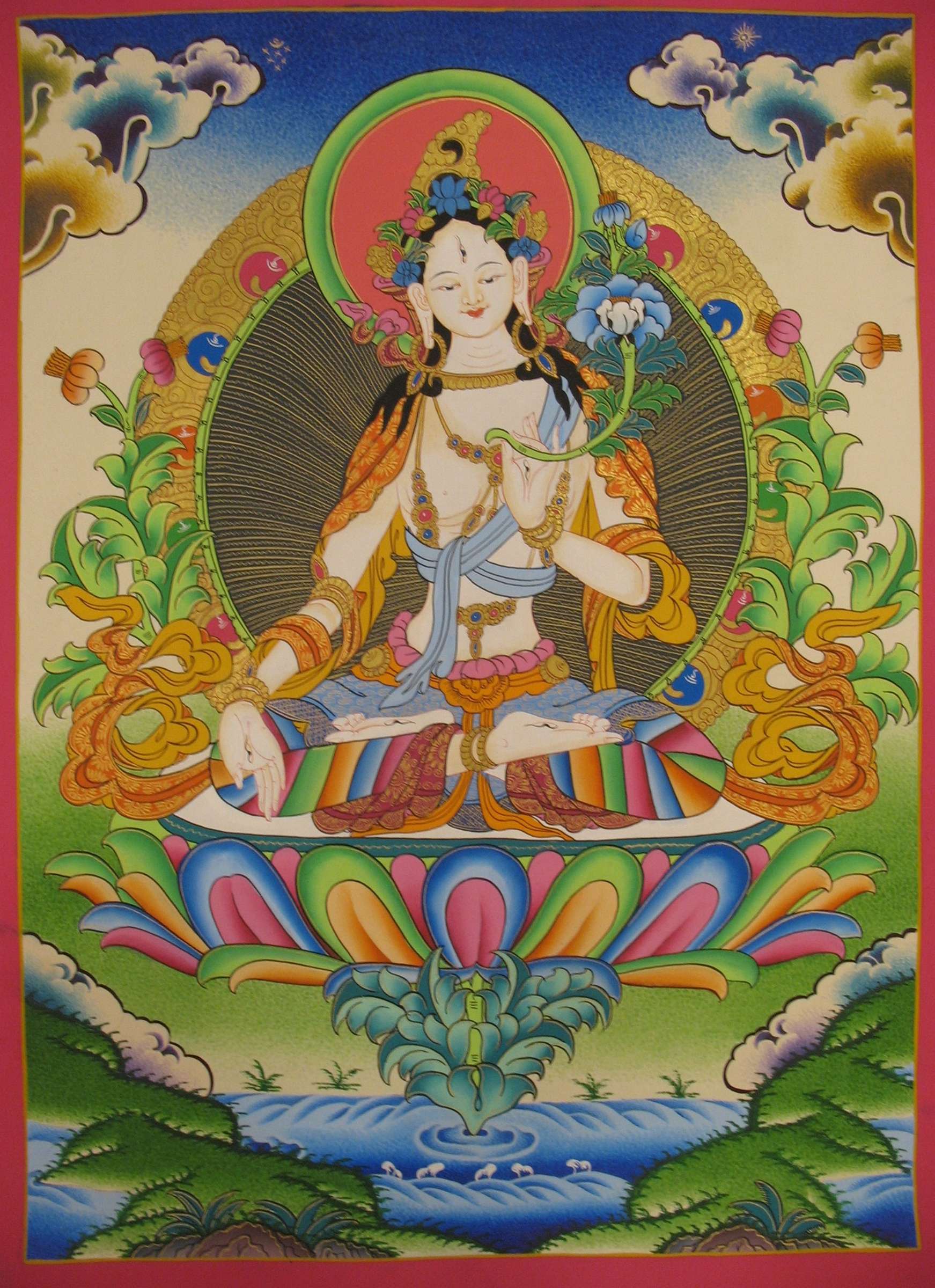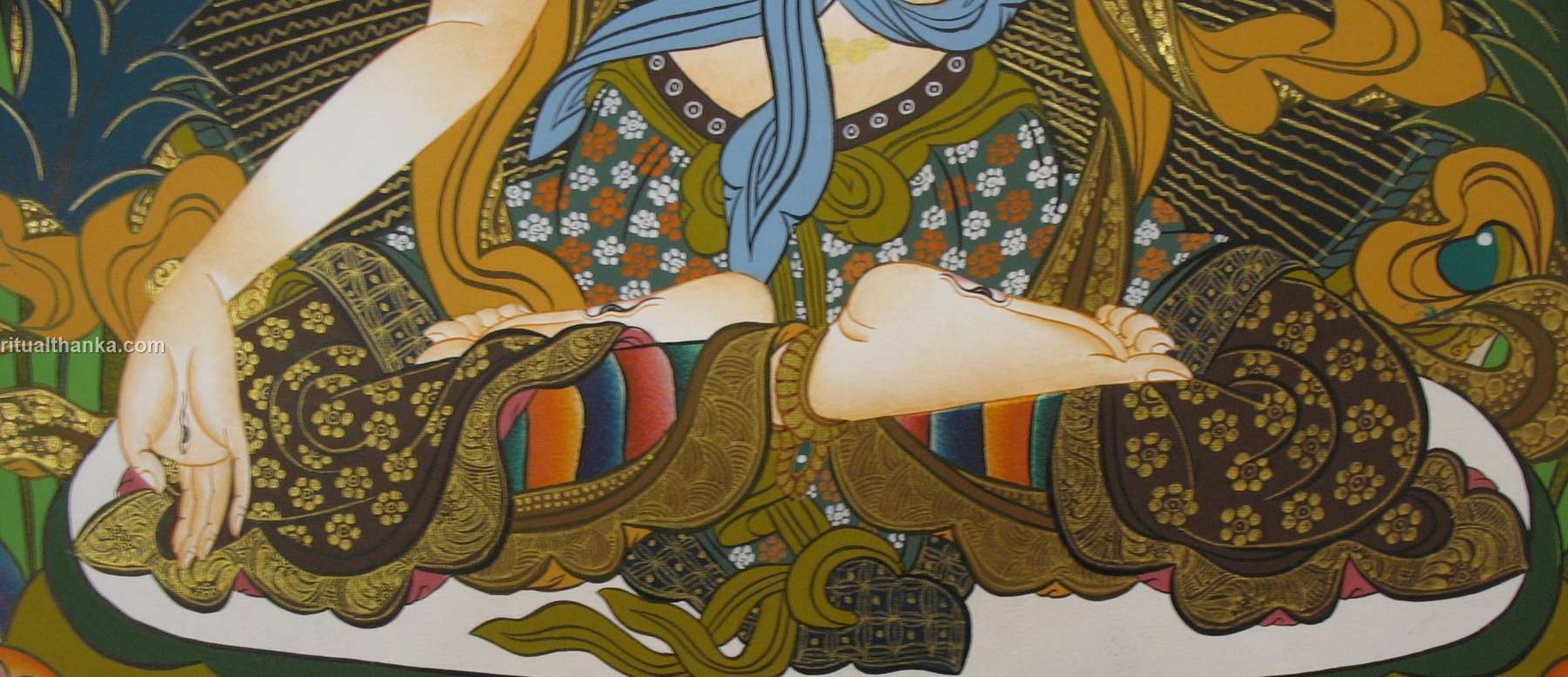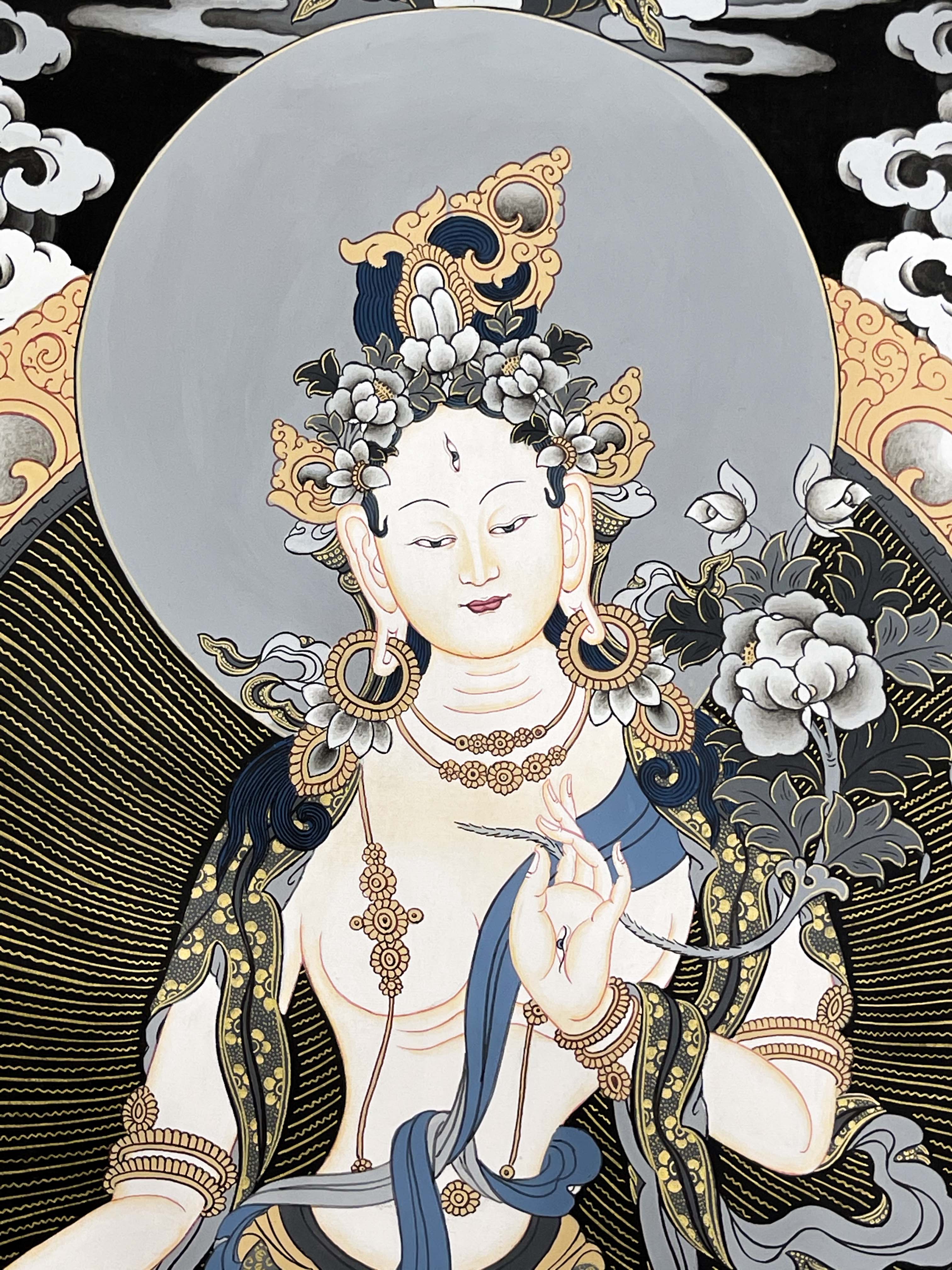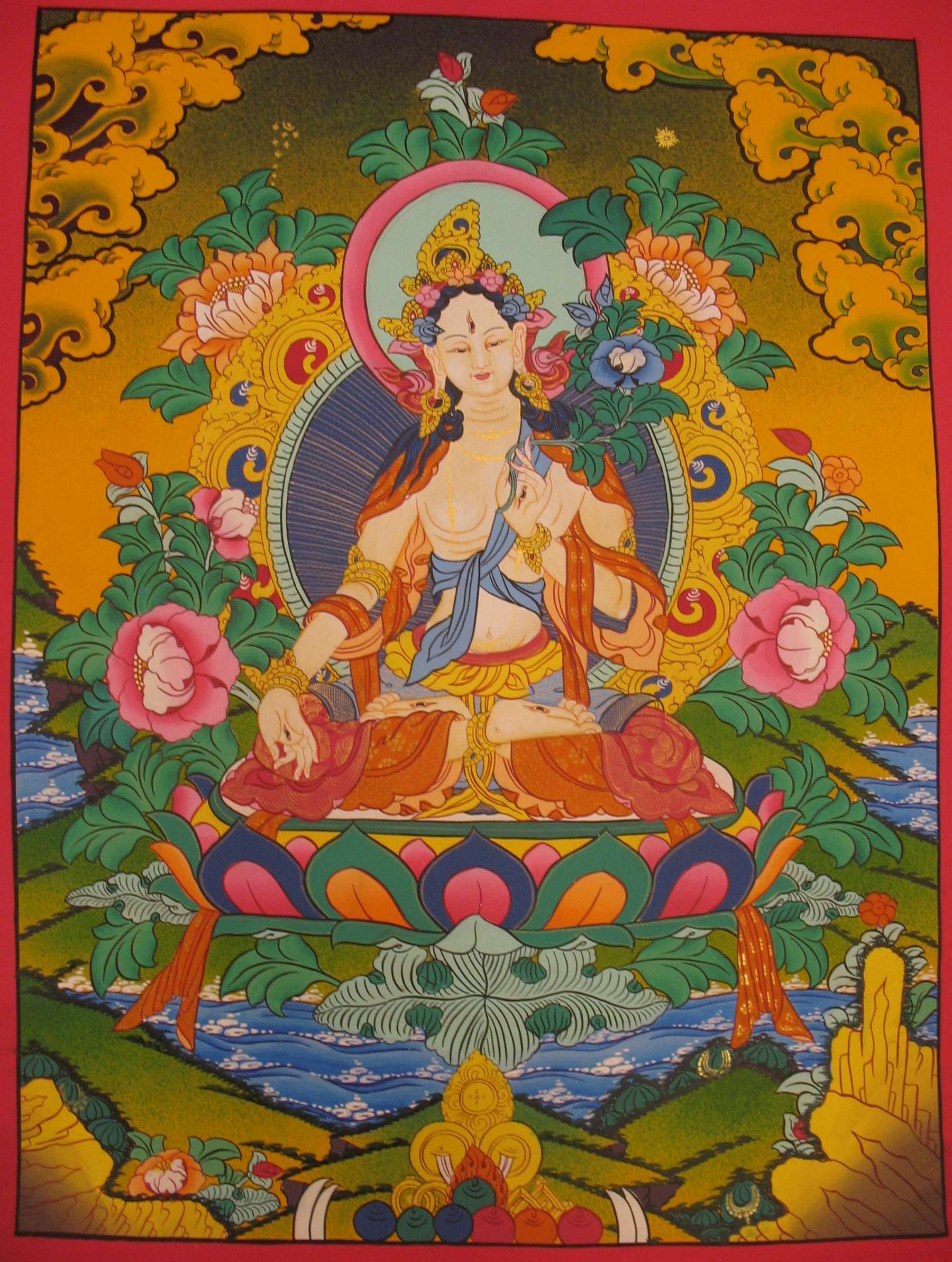Code
HCS13230
Weight
100 gm / 0.22 lbs
Size
Height
50cm (20") Width
38cm (15") Material
Handmade Canvas
Availability
Available
Date Added
2017-06-15 18:42:53
Note : We used to sell this product 8 years ago so it may no longer be in our stock.
It is possible that we still have it with our suppliers but the price could be different from before.
Feel free to order. We will verify availability and inform you promptly.
It is possible that we still have it with our suppliers but the price could be different from before.
Feel free to order. We will verify availability and inform you promptly.

Safe Payment
We accept Paypal, Money Transfer, Bank Transfer
Confidence
Protection covers your purchase and personal data.
Worldwide Delivery
We ship Worldwide, except Russia.Shipping cost US$25.2 for upto 0.5 kgs

Hotline
Talk to help line for your question on 9841267335Introduction to Thangka
A thangka, also known as tangka, thanka, or tanka, is a vibrant and intricate Tibetan Buddhist painting that serves as a visual representation of spiritual teachings. Crafted with meticulous detail on cotton or silk appliqué, thangkas depict a wide range of subjects including Buddhist deities, sacred scenes, mandalas, and narrative stories. These sacred artworks are traditionally kept unframed and rolled up for storage, resembling ancient scrolls. To protect their delicate nature, thangkas are mounted on textile backings and often adorned with a silk cover on the front. Proper preservation in dry environments is crucial to maintain the integrity and longevity of the silk. Read More . . .
A thangka, also known as tangka, thanka, or tanka, is a vibrant and intricate Tibetan Buddhist painting that serves as a visual representation of spiritual teachings. Crafted with meticulous detail on cotton or silk appliqué, thangkas depict a wide range of subjects including Buddhist deities, sacred scenes, mandalas, and narrative stories. These sacred artworks are traditionally kept unframed and rolled up for storage, resembling ancient scrolls. To protect their delicate nature, thangkas are mounted on textile backings and often adorned with a silk cover on the front. Proper preservation in dry environments is crucial to maintain the integrity and longevity of the silk. Read More . . .
Brief Introduction :
Sitātapatrā (Sanskrit: "White Parasol",) is a protector against supernatural danger. She is venerated in both the Mahayana and Vajrayana traditions. She is also known as Uṣṇīṣa Sitātapatrā. It is believed that Sitātapatrā is a powerful independent deity emanated by Gautama Buddha from his uṣṇīṣa. Whoever practices her mantra will be reborn in Amitābha's pure land of Sukhāvatī as well as gaining protection against supernatural danger and witchcraft
Forms :There are several different forms of Sitatapatra including: with one face and two arms; with three faces and six arms; with three faces and eight arms; with three faces and ten arms; with five faces and ten arms; and, with 1000 faces, 1000 arms and 1000 legs
Symbolism :Sitātapatrā is one of the most complex Vajrayana goddesses. According to Miranda Shaw in the Buddhist Goddesses of India, Sitātapatrā emerged from Buddha's uṣṇīṣa when he was in the Trāyastriṃśa heaven.[citation needed] The Buddha announced her role to "cut asunder completely all malignant demons, to cut asunder all the spells of others...to turn aside all enemies and dangers and hatred." Sitātapatrā's benign and beautiful form belies her ferocity as she is a "fierce, terrifying goddess, garlanded by flames, a pulverizer of enemies and demons."
In the Mahayana Sitatapatra Sutra, she is called Aparājita "Undefeatable, Unconquerable" and is also identified as a form of goddess Tārā.
In other sutras, she is regarded as a female counterpart to Avalokiteśvara, the bodhisattva of compassion. Like him, Sitātapatrā manifests in many elaborate forms: having a thousand faces, arms and legs, or simply as a feminine deity of great beauty. Known foremost for her "white parasol" she is most frequently attributed with the "golden wheel". The auspiciousness of the turning of the dharma wheel is symbolic of Buddhism, both in its teachings and realizations.
In the Mahayana Sitatapatra Sutra, she is called Aparājita "Undefeatable, Unconquerable" and is also identified as a form of goddess Tārā.
In other sutras, she is regarded as a female counterpart to Avalokiteśvara, the bodhisattva of compassion. Like him, Sitātapatrā manifests in many elaborate forms: having a thousand faces, arms and legs, or simply as a feminine deity of great beauty. Known foremost for her "white parasol" she is most frequently attributed with the "golden wheel". The auspiciousness of the turning of the dharma wheel is symbolic of Buddhism, both in its teachings and realizations.


![Tibetan Thangka Sitatapatra -white Umbrella- [real Gold], [hq]](https://handicraftseller.com/uploads/pics/product/thumb/2017/06/13230.jpg)
![Tibetan Thangka Sitatapatra -white Umbrella- [real Gold], [hq]](https://handicraftseller.com/uploads/pics/product/thumb/2017/06/13230_0.jpg)










 of White Tara" title="Tibetan Thangka
of White Tara" title="Tibetan Thangka  of White Tara,
of White Tara,  of White Tara,
of White Tara,  of White Tara,
of White Tara,  of White Tara,
of White Tara,  of White Tara, Lamas Art,
of White Tara, Lamas Art,  of White Tara, Lamas Art,
of White Tara, Lamas Art,  of White Tara" title="Tibetan Thangka
of White Tara" title="Tibetan Thangka  of White Tara,
of White Tara,  of White Tara,
of White Tara,  of White Tara,
of White Tara,  of White Tara,
of White Tara, 

 of White Tara,
of White Tara,  of White Tara,
of White Tara,  of White Tara" title="Tibetan Thangka
of White Tara" title="Tibetan Thangka